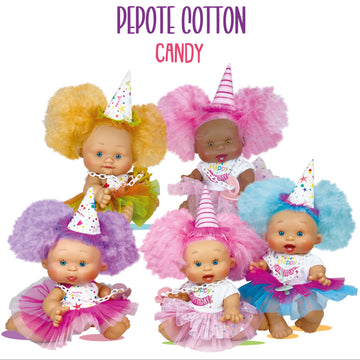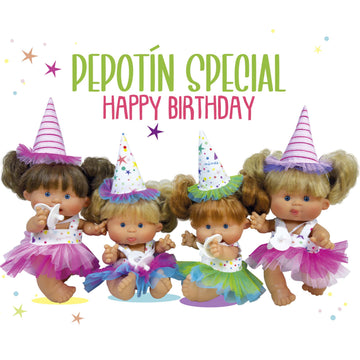The Best Strategy To Use For Dolls And Accessories
Repeating reassuring regimens with a doll (feeding, shaking, closing) can aid children feel tranquil and safe and secure. These comforting rituals show them just how to self-regulate. Dealing with a doll can make a youngster feel qualified and certain - european dolls. It provides them a feeling of responsibility and control in a globe that frequently feels uncertain.
Not known Details About Dolls And Accessories
When children see dolls that show their race, heritage, and culture, it strengthens a positive sense of identification. It claims, "You belong. Your tale matters." Dolls additionally present children to cultures outside their own, developing considerate curiosity and compassion for others. This is where comprehensive play can result in comprehensive areas.
As Dr. Karyn Purvis, a leader in kid advancement and trauma-informed care, when stated: This effective quote highlights just how play isn't simply funit's just how youngsters learn ideal. The brain cords itself through repetition. However when a kid is involved, happy, and psychologically linked to an activitylike doll playthe brain strengthens those connections much faster and more meaningfully.
The Only Guide for Dolls And Accessories

Boys need compassion, kindness, and imagination tooand doll play uses that. Yesdolls supply something distinct. They motivate flexible narration and psychological connection in a way few various other toys do. Dolls are often a kid's very first "pal," helping them practice relationships, construct interaction skills, and feel comforted. Children develop their sense of self from a young age.
An Unbiased View of Dolls And Accessories
With play. With pride. Via dolls that matter. Many thanks for joining us on this journey. Samantha Ong Samantha Ong is the founder of Joeydolls, a Canadian-based plaything brand on a mission to commemorate Eastern cultures through cheerful, comprehensive play. Motivated by her own experiences maturing without social representation, Samantha designs dolls that aid kids really feel honored of that they are while sparking curiosity and compassion in others.
Playing with dolls motivates children to speak more regarding others' ideas and feelings, a study has found. The research suggests that playing fictional games with dolls might aid children establish social skills, theory of mind and compassion. The neuroscientist that led the work stated that the instructional value of having fun with Lego and building and construction toys was commonly approved, but the benefits of having fun with dolls sometimes appeared to have actually been neglected."When youngsters produce fictional globes and function play with dolls, they connect at first out loud and after that internalise the message regarding others' ideas, feelings and feelings," stated Dr Sarah Gerson, a neuroscientist at Cardiff College and the lead writer.
Getting My Dolls And Accessories To Work
They were also more probable to resolve the dolls in the second person, talking with them directly, whereas the personalities on the computer screen they had a tendency to refer to in the 3rd person. No distinction was observed between children and ladies."Interior state language can indicate that a child is thinking of other individuals's ideas and feelings while having fun with dolls," stated Gerson.
And that they see language usage hereof is great verification of the theory."Mardell added that the searchings for should put on any kind of type of role-play plaything, rather than specifying to Barbies. "I 'd take a broader view of what a doll is," he claimed." [Maybe] any kind of item that the kid can spend a feeling of other into a packed pet, an oven glove that talks with them, or perhaps a fictional close friend."Children typically start to reveal indications of internal state language around the age of four.
Not known Factual Statements About Dolls And Accessories
"It comes to be important for making and sustaining relationships, and how they gain from their instructors, and moms and dads."The study likewise found that the children had boosted mind activity in the posterior remarkable temporal sulcus (pSTS) area when they talked as though their dolls had ideas and feelings. The pSTS area is thought to be entailed in the advancement of social and emotional processing skills.
Childhood is not a fixed life phase; indeed, the interpretation, definition and understanding of childhood are all subject to alteration. By the 19th century one of the most extensive adjustments was the relevance put on enabling children to experience "the care free joys" of childhood years via play activities. Play was currently taken into consideration to be an essential part of a great youth.
In order to completely understand the definition of play, one need to likewise recognize the relevance of the doll. Dolls are a lot more than toys developed to delight young women. During the 19th century proper playtime tasks were chosen to advertise intellectual, physical or emotional growth. Dolls were specifically preferred because they were assumed to foster and support feminine top qualities such as kindness, caring and empathy.
Rumored Buzz on Dolls And Accessories

(https://issuu.com/dollsnaccsrs)Contemporary literary works, journals, journals and also paints, confirm making use of dolls in the process of gender socialization. As useful as they may be, these documents paint an incomplete and biased photo. Historic archaeology should be used in order to record the cultural relevance and meaning of dolls in various other circumstances.
It is only through historical investigations that researchers can want to discover and record the her explanation full series of playtime experiences. Chronicling these experiences, and specifically the duty of dolls, is important for providing a more full image of childhood during the 19th century. Alarcn, Sara E - european dolls., "Kid's Play: The Function of Dolls in 19th Century Childhood" (2007 )
Comments on “Little Known Facts About Dolls And Accessories.”